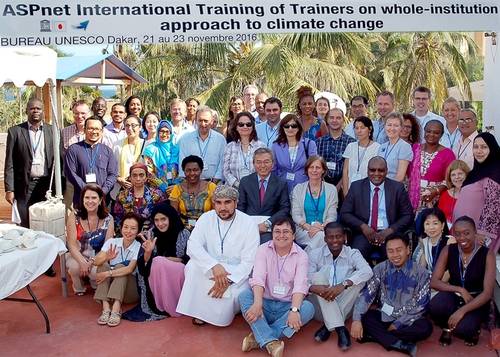How to transform schools step-by-step to address climate change was the theme of an international training of trainers which gathered over 40 participants from 12 countries in Dakar, Senegal.
 The Associated Schools Network (ASPnet) international training of trainers, organized by UNESCO from 21 to 23 November 2016 brought together teachers and national project coordinators from Brazil, Denmark, Dominican Republic, France, Germany, Greece, Indonesia, Japan, Lebanon, Namibia, Oman, and Senegal.
The Associated Schools Network (ASPnet) international training of trainers, organized by UNESCO from 21 to 23 November 2016 brought together teachers and national project coordinators from Brazil, Denmark, Dominican Republic, France, Germany, Greece, Indonesia, Japan, Lebanon, Namibia, Oman, and Senegal.
The three-day meeting helped strengthen participants’ capacity to implement the “whole-institution approach” to climate change in their schools, to monitor and coordinate the process at national level and to train teachers from other schools participating in the project.
They were shown the UNESCO video “Learning to address climate change” to illustrate why climate change education is important to shape sustainable development and the critical role schools have to play.
Mr Gwang-Chol Chang, Director, a.i, UNESCO Dakar, said: “Education and awareness-raising enable informed decision-making, play an essential role in increasing adaptation and mitigation capacities of communities, and empower women and men to adopt sustainable lifestyles.”
The training equipped participants to lead and implement a school action plan on climate change with training sessions focusing on how to effectively communicate the idea of whole-school action and identifying key stakeholders in and outside the school and ways to involve them. Participants also discussed how to integrate climate change topics into all subjects, including languages or mathematic. The training also deepened participants’ knowledge about climate change and UNESCO’s work on education for sustainable development (ESD).
Concrete training on climate action
As teachers and project coordinators will go on to train other ASPnet teachers on the topic in the coming months, the workshop put emphasis on key elements of peer training and interactive learning using group work, practical exercises including how to prepare an elevator pitch on the subject, case studies and role plays. The last day was devoted to preparing action plans for national peer training and longer-term peer learning activities. Sabine Detzel, the International ASPnet Coordinator, said: “This training is very concrete and will give ASPnet actors the means to transform their institutions and to engage their students and the wider communities into climate action. Next year, 130 additional UNESCO Associated Schools from another 13 countries will join the project.”
During a visit of the ASPnet member school, Cours Sainte Marie de Hann in Dakar, trainees spoke to students and teachers who presented some of the school’s environmental and climate change-related initiatives such as a green wall, a vegetable garden, a mini-zoo and an exhibition on a research project on millet.
The training of trainers is part of a new ASPnet project piloting the implementation of the whole-institution approach to ESD with a special focus on climate change. It kicks-off the development and implementation of action plans on climate change in the 120 schools that are part of the project. These schools took part in the international climate change seminar organised by UNESCO at the climate conference COP 21 in Paris in 2015. A second group with ASPnet representatives from 13 countries will take place in spring 2017. The project is part of the Global Action Programme on ESD (GAP) supported by the Government of Japan.